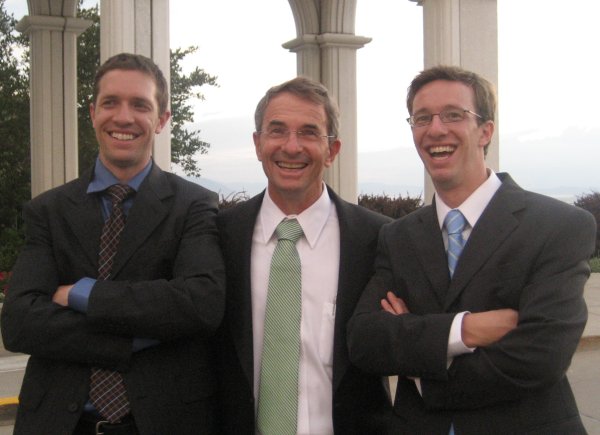Why I Choose Commercial Spaceflight
Things have been going great starting at SpaceX. There’s a lot to share, with Flight 3, our successful 9 engine firing, and a lot of other stuff, but first I want to get into what this means to me, and why I choose this direction.

(Pictures from my little bro Brandon's wedding)
This is important to me... Very important.

(For unbelievably good and artistic wedding pictures click here.)
It could seem like a no-brainer to want to do spaceflight; it’s one of the coolest things in the world. But there’s a lot more to why I choose this, and that doesn’t easily get recognized. First I’ll replace some assumed motivations with my real motivations.

First of all, I do not have a passion for spaceflight.
I have a passion for human achievement and prosperity, combined with a passion for creation, and a preference for complex systems.
Second, it is not my “dream” to walk on the Moon.
I choose the objective of walking on the Moon because of what will be required for me to achieve that goal. I want to experience the life that I will have to live in order to walk on the Moon.
Third, I choose the objective of walking on the Moon because of the peripheral effects (second order effects) that will come about as a result of me pursuing this objective. All our actions shape the world we live in, directly and indirectly, and whether we intend the results or not. The second order effects of my work are as important to me as the first order effects.

On the first two reasons...
In Hired Minds I write that the advice “Do what you’re passionate about” is one of the most worthless pieces of advice to give to an undergraduate choosing their major or their career. Few people are passionate about something concrete or objective such as spaceflight, thermal analysis, accounting, or reporting on the mobile communications market. Most people are passionate about embodying some set of characteristics. For example, many people want to feel that they are reliable, innovative, fun, compassionate, etc. They don’t really care what they do in particular, but they want to feel they embody those characteristics. Beyond that basis, people differ at the next level of preferences, such as enjoying interacting with people, technical design, rapid decision making, etc. And of course, there is a scale between wanting to personally feel they embody certain characteristics, and they want others to perceive them as embodying those characteristics.
I’m no different than most people in this respect. I want to embody a set of characteristics, and I choose my objectives according to my sequence of preferences. I enjoy achieving and creating, and I have a preference for high systematic complexity. I enjoy working with highly motivated and intelligent people, coordinating decisions based on objective judgment. Technical challenges offer the systematic complexity I enjoy. Commercial engineering projects offer the human interaction and rapid pace I enjoy. Thus, I was naturally inclined to take engineering in a business direction.
Before choosing a career in spaceflight, I was planning to spend my career in manufacturing automation. It was happenstance that I wound up working for Northrop Grumman in LA. I wanted to spend a couple years in southern California, and satellites sounded as cool as automation, so I took that path.

I never wanted to be a NASA astronaut because I wouldn’t want to compete with my buddies for a finite number of astronaut positions. I prefer to work with people in a win-win game, where each individual’s success lifts all others toward their goals. The entrepreneurial capitalist model as opposed to the selective command and control model.
It was June 21st, 2004, at Burt Rutan’s first test flight for the X Prize, when I saw commercial spaceflight as a viable possibility. It was that afternoon when I recognized that I would make this my professional ambition. I chose the objective of “Waling on the Moon” as the navigation point by which I would direct my career decisions. Even then, it was not for the dream of walking on the Moon, but my enjoyment of achievement, and the life that would be required to reach that objective.

_
So, moving into my third stated reason for choosing Commercial Spaceflight: the second-order effects. Namely, the second order effects of what it demonstrates about the capabilities of different organizing systems of society, what it produces economically in society, what it produces psychologically in society, and what it produces in the individual lives of the participants.
Starting with what it demonstrates about the capabilities of different organizing systems of society.
I believe in the power of Commercial Markets; not free-for-all anarchistic Black Markets, but appropriately regulated and competitive Commercial Markets (reference Alan Greenspan’s comparison in Age of Turbulence). I believe that Commercial Markets provide the most equitable opportunity for people to prosper according to their own efforts and desires, and that they also evolve with the ever-changing world in the most (long-term) efficient way of any other system. However, the argument is made that Government organizations are required to accomplish anything of really great magnitude... such as sending a man to the Moon.

Even in the arena of really big accomplishments, I believe that Commercial Markets are more effective (not to mention more efficient) than government bodies. Yes, NASA made it to the Moon, and no commercial entity has yet accomplished such a feat. Now, the Moon is a big accomplishment, but how about putting a cellular phone in the hand of everyone in the developed world? How about putting a personal computer in every household? How about linking all those computers into a worldwide forum to communicate, share information, engage in commerce, and just plain entertainment? In my judgment, these developments are far more impressive and far more complex than a shot to the Moon... and they were achieved without any political or governing directive commanding it to happen.
Granted, these other achievements were able to grow organically with a smaller price of entry, but they demonstrate the power of Commercial Markets (appropriately regulated and competitive) to produce astounding results. But fields with high cost of entry, such as spaceflight, are arguably different.
Even on the largest scale, I believe that Commercial Markets, left to their natural dynamics, can more effectively accomplish very large endeavors. I see SpaceX as a group demonstrating the feasibility of this belief. Whether I’m part of the team or not, they embody the dynamics through which tremendous human achievements can be most effectively accomplished. Burt Rutan demonstrated this in building SpaceShip One for a scant $25 million… with Peter Diamandis (X Prize) and Paul Allen (funding Rutan) embodying the natural dynamics that evolve to encourage financing for such endeavors.

(My cousins with their husbands. Great matches.)
Operating on the same premise of the appropriate role of government and private industry, but in the realm of philanthropy as opposed to achievement, we have the Gates Foundation. The Gates Foundation is demonstrating that wealthy people can execute “charitable” causes more effectively than the government. The Mormon church has likewise demonstrated that a religious organization, independent of any government funding, can do things far more effectively… not only in terms of humanitarian aid, but extraordinarily in welfare programs, education in developing countries, etc.
Large scale philanthropy, just like large scale achievement, requires the application of extensive resources and extensive organization. Thus, these things cannot be accomplished without the action of a government, or the action of a collection of highly competent and wealthy individuals.

(Brandon's close buds since they were kids in Colorado. All married this summer.)
Within human society, there is a healthy need for achievement, for philanthropy, for fair but aggressive competition, for social safety nets, for disparity and equality of opportunity, and so forth. Too little or too much of any of these… and a society will find some way to correct the balance, or it will decay until the balance is corrected. In a society with broad and strong governing systems, there exists the option to have the government command the perceived need for adjustment. In a society with a healthy capitalist system (Commercial Market), you must rely on the capable, wealthy, and powerful individuals to perceive the need for adjusting the balance, and trust them to take appropriate action. In a capitalist democratic system, if the society fears these society-wide needs will be neglected by the capable and wealthy, then there is a natural reflex to use the power of the government to force the changes that the collective group perceives are requisite. When people vote to act on their fears, then we get government driven social support programs, philanthropic spending, and so forth, all funded from taxation.
In the US, the original force that caused government to begin this mobilization for large programs was WW I. Before this, large efforts such as laying rail road across the continent were largely left up to wealthy business men such as Cornelius Vanderbilt, Andrew Carnegie, J.P. Morgan, and their commercial enterprises. The government (appropriately) mobilized the country for a military need of WW I. Then in the depression following the war, another mobilization attempt was made to pull the country’s economy together.
Then WW II came along and again we had to mobilize for military purposes. Following WW II, Eisenhower attempted to reduce the role of government in the country, but the need to maintain a standing army against the Soviet threat brought the need to continued government mobilization. Eisenhower chose to develop rockets as delivery systems for nuclear weapons in favor of the more technologically simple alternative of a large standing army. Then we had a progressing rocketry program, and increasing perception that power in space would grant greater military advantage… and a new president with a political need to inspire the country, and continue to advance our edge on the soviet threat.
So Kennedy chose the objective of putting a man on the Moon, which objective would serve dual purposes of inspired the nation while developing our capability to execute on our existing military strategy. At the time, the Keynesian economic theory also held that this government driven mobilization would also lift the economy. Friedman and reality showed that economic belief to be wrong, but Kennedy’s first two objectives were still achieved, even though the third purpose failed... but Kennedy was doing the best he knew how.
So, NASA was created under the guise of serving a Civilian purpose, and the US government first entered into large scale mobilization to provide for the needs of society.

Following right on the heels of the success of the Apollo program (a technological endeavor which was a huge achievement, although enormously expensive), governing officials were supported by the electorate in creating multiple “Apollo Programs” to fix all the social ills of society. Social ills are intrinsically different than technological endeavors, but human optimism doesn’t always see such differences right away. So throughout the 70’s, we saw increasing expansion of government directed “fixes” for society. By the time the 80’s and 90’s rolled around, the middle-aged public had grown up in a world with increasing taxation and large government programs, and didn’t know anything else, so an extra tax here and an new government program there seemed like a benign and normal thing. This next generation had grown up accustomed to significantly higher taxes, significantly more government involvement in society, etc.

(Canyons in Utah)
Now days, with the world relatively at peace compared to the eras of the World Wars, we have the remaining government mobilization that did not exist before. The question now is to be asked, what remaining government mobilization is appropriate and effective, and what is not?
The Apollo program sending a man to the Moon demonstrated to society that government directed achievement could be successful, inspiring, and good for society. The excesses and inefficiencies of government in its many other endeavors since that time have also demonstrated the limitations and inabilities of government initiatives. So we want the good, but don’t want the bad.
SpaceX is a participant in demonstrating that a commercial system can be relied upon to inspire society, and push us forward into the universe. The Gates Foundation is demonstrating that a commercial system can fulfill the philanthropic needs of society. Presently society has great concern over climate change, and it is evident from the electorate that many believe a commercial solution, as opposed to a government directed solution, will be more effective in solving the perceived problem.

(My Mom with her sisters and brother.)
As a society, we are learning which methods are most effective for achievements and initiatives of different natures. We learn from the experiments made by companies such as SpaceX, executives such as Bill Gates, and the thousands of companies that play their individual roles in making worldwide internet and cellular communication not only possible, but tremendously inexpensive.
I join SpaceX and choose a career in commercial spaceflight, because flagship accomplishments such as putting a man on the Moon are very powerful in shaping the views and opinions of society at large. When a commercial team can put a man on the Moon, at a single digit percentage of the cost that the government did... and especially while the government still can’t repeat the achievement, society as a whole notices and votes for governing representatives who will implement policies which allow society to operate on its more effective commercial systems, instead of less effective government directed systems.
I believe that humans are collectively capable, over the long term, of learning and implementing increasingly effective methods of organizing their society. I personally spent a couple years believing socialism was morally and economically superior to capitalism... until I learned more of history, economics, and thought deeper into the moral dynamics of individuals within the two systems. It takes time, attention, and experimentation for individuals and societies to collectively learn, but with effort, they do learn, and we can increase our own prosperity, and the prosperity of those to follow.
_

So that introduces the second order effects of the mission of SpaceX on society. Next would be the effects on the individual lives of people participating… but I’ve written enough for now. Society is made up of individuals, and what is good for society becomes, in the aggregate, good for the individuals. But for now, I’ll leave on this note that SpaceX is a flagship demonstration of the capability and efficiency of Commercial Markets to produce the greatest achievements of humanity.